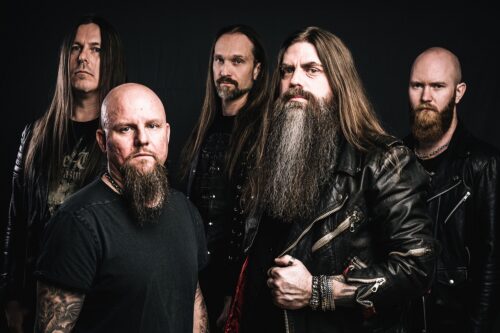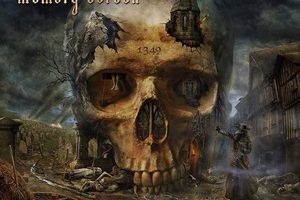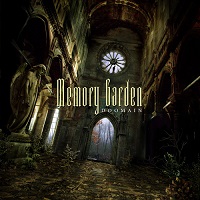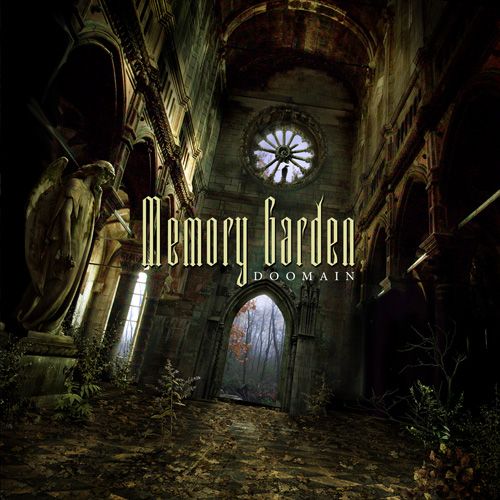Memory Garden – Distrust of the Messenger
Thursday, 20th January 2022
Epic doom as a genre already has a cult-like status and following across the globe. Add in some melodic and old school power touches, and you have the makings of Memory Garden. Together now for almost thirty years, the quantity of their output may be sparse to some as 1349 is only the quintet’s sixth studio record. But the quality of songwriting and performances cannot be denied – especially if names like Candlemass, Memento Mori, and Morgana Lefay mean something to your record collections.
We reached out on Skype to drummer Tom Björn and bassist Johan Fredrikson to catch up on the latest release. We cover everything from the lyrical content, the slow and steady work ethic behind the band, their work with various record labels over the years, special memories from their careers, and talk from acts like Mötley Crüe to Opeth to Ghost among others.
Dead Rhetoric: 1349 is the latest Memory Garden album, your sixth studio record and first in eight years with the group. Tell us about the songwriting and recording sessions on this set of material – where do you see the major differences this time around compared to your previous discography?
Tom Björn: The process has been pretty much the same as Doomain, the previous album. We have our own studio, a simple set up, but we can do pretty much everything there. It has been, the making of Doomain as well as the making of 1349, such a long time of recording and rehearsals. They go together all the time. It’s hard to say how much time we’ve spent recording. It’s not easy to say since things are done over a large period of time.
Johan Fredrikson: We do see each other in the studio once a week normally. That’s probably the main reason why it has taken us eight years to produce a new record since Doomain. It’s a combination of recording, writing songs, composing, we have periods where we rehearse new songs and get the foundations for these songs, and start recording bass, drums, and some rhythm guitars to build from there.
Björn: Some things may change along the way, as well. We don’t have a clock ticking, there is no record label pushing us. Maybe that’s both good and bad – having your own studio you can take the time and feel fully content with all the songs, change details to infinity. But as long as you come to a point where you say, okay – everyone is satisfied, this song is finished. It was a good thing for us to take this time with 1349 to make every song the best it could be.
It’s so hard to describe your own music. When you are deeply into something like making an album, we have our pillars. We need the heaviness, we need the melody, the melancholy stuff. It’s so hard to distinguish the differences between the albums. We’ve done better songs this time – they are very well composed.
Fredrikson: When I look at the discography of Memory Garden, I’ve been with the band since the two latest albums. I would say this may be somewhat of a difference if you compare all the albums – the lineup changed a bit with two new members in there between myself and Ante Mäkelä on guitar. I wouldn’t know how the songwriting process has changed.
Björn: Before we all had families, kids, and everything, we could spend more time rehearsing. Now that hasn’t been the case. The first albums, we probably rehearsed them more. And then we went into studios like Studio Fredman for the first album Tides, we knew all the songs better and had a week to record it. We couldn’t have done that process for 1349, that would be impossible. It’s so much work to put into every song withboth guitars, vocals, choirs, keyboards. So much more work on this album compared to the previous ones. It’s a natural development, we want to express more things with the songs.
Dead Rhetoric: You tackled the black plague as a conceptual storyline this time around – floating between fact and fiction for the lyrical content. Can you discuss how the process worked when it came to the fact versus fiction angles – did you do proper research for factual information and then figure out from there how you wanted to twist things to fit the musical platform?
Björn: The lyrical parts, there are facts and its more inspired by the situations. It shouldn’t be taken, the album, as a history lesson – it’s more about inspiration running through every song. The storyline, we have the main character, this little boy, it’s told in some different perspectives what happens to that little boy. The stories talk about certain events that happened around the Black Plague – the suffering going on in 1349 with the horrible king there, hiding in his castle but in the end, he can’t get away – he also gets the disease. It’s definitely more fiction than fact. We had most of the songs done before we started with the lyrics. We had the order of the songs made as well. There was a lot of stuff added when the lyrics came together. There are always things you change and try out. Things changed until the very end of the whole process.
Dead Rhetoric: How did the guest musicians come into mind for this record – were they chosen based on the specific needs of those songs to give more color and depth to those parts?
Björn: Josefin (Bäck) we have known since way back with our first demo tape back in 1993. We knew she has a great voice, and there was something there. When the lyrics came to be, and the story, and the part within “The Messenger” we knew we had to ask her and hope that she would help us out with that. Luckily, she did, we are super happy with her performance. And then Niklas Stålvind, for “The Empiric”, he has a cool, psycho expression that fits the theme of that song. Almost playing a psycho doctor, a sadistic one. And also, the final musician Johan can tell you a little about that.
Fredrikson: It’s my father Göran, he actually plays a number of medieval instruments. I thought they would be related to those times – we brought him into the studio to see what we could get out of it to use on the record, create a vibe for a song that could be appropriate. We ended up using some hurdy-gurdy instrument, and also something called a Jew’s harp, that you play with your mouth.
Dead Rhetoric: After spending time with numerous record labels from Heathendoom to Metal Blade and Vic Records, you are now a part of No Remorse Records. How do you feel you’ve been treated over the years, especially considering the subgenres of power and doom metal that you cross over that may not necessarily be easily marketable in certain time periods of the metal scene?
Björn: That’s true. I’ve read that in reviews, some reviewers say that power metal and doom, they are on opposite sides of the spectrum. Somehow, we get it to work. Personally, I don’t listen to power metal, I think it’s cheesy and there are too many cliches. Of course, there are bands that I can listen to from the genre, but generally I don’t. The question of the labels, we’ve always been treated very well. As far as Heathendoom, they were two guys that put a lot of heart and soul into their work. They put out Forever the first mini-CD and Tides the first full-length album. Albums number two and three were on Metal Blade. I’m really happy they gave us a chance there, we were such a small band on their big label. We are not a touring band, we’ve never been, we don’t draw a lot of money into a label. I’m very grateful they took us on there and put our albums out, I understand we are too small for them.
The next record Carnage Carnival was on Vic Records, another guy with a big heart. He didn’t have a lot of money, couldn’t support us in that way but he did what he could, got the album out. Then back to Metal Blade for Doomain, and now No Remorse, a smaller Greek label. This is a better forum for us, to be a bigger band on a smaller label. I think we will benefit from that.
Dead Rhetoric: Although the band was very productive in the late 1990’s/early 2000’s, you’ve only released three albums over the past twenty-one years. What conditions take place for this ‘quality versus quantity’ output when it comes to Memory Garden?
Fredrikson: I suppose in a way, it’s probably the only way for Memory Garden. Since there has been a lot going on in all of our lives. We have been keeping Memory Garden active the whole time, to my knowledge the band has never been on hold, it’s always been active to some degree. As you said in the last twenty-one years, probably not as productive as a lot of other bands. If you are going to be that low in productivity, you better make sure that what you are releasing is high quality and something you are putting your maximum heart and soul into. It’s rare for us to have any deadlines really – at least since I joined the band. Any album we have been working on, the label we’ve been on has always said to us make the best album we can, and they will be there to release it when it’s done.
Björn: The funny thing is, we’ve never put the band on hold. A lot of people seem to believe that we have reunited, or reformed (laughs). We were never away.
Dead Rhetoric: What would you consider some of the special memories or moments when assessing the career of Memory Garden from the start until now?
Björn: Special moments. From the top of my head, Memory Garden getting recognized being the EP of the week in Kerrang! We got 4K’s and a very good review. There have been many (moments) along the way. The first full-length Tides was monumental for me personally. We put a lot of heart and soul into that album as well. There are always these gigs coming up that feel more important. Sweden Rock, we played Wacken in 1999. I’m not sure about highlights. At the moment, my highlight is 1349, honestly. We have to take all this joy and fine reviews in and enjoy that.
Dead Rhetoric: Do you believe how you define success has changed as a musician and within Memory Garden from the inception of the group to your current status?
Björn: We never have really aimed for success in a way like that. We’ve always had this band as a hobby, creating music that we love. It has been well-received, and we’ve taken all the chances we can get with gigs to do the best possible thing all the time. None of us had any high expectations, really. We weren’t aiming for the stars.
Fredrikson: The band this year is going to celebrate its 30th anniversary. It was hard to see that all of a sudden making it big. It’s difficult to measure, what does success mean? We are also in a genre that is quite niche still. It’s epic doom, or melodic doom, whatever you want to call it. It’s successful that it’s received positively by that community. We feel that 1349 as a result is a success.
Björn: In fact, we got picked up on some Facebook group power metal page, now we are getting some attention from that side as well. We are super happy with any attention that we can get.
Dead Rhetoric: Sweden has had a rich history with both the power and doom genres. Do you think there are specific circumstances, environmental or personal, that have found their way into the musical output of your country that caused you to gravitate towards those styles?
Björn: I guess its as much in our childhood, our upbringing, the influences and our idols. What kind of posters you put up on your wall – I had posters of Mötley Crüe, Skid Row at age twelve. Slowly walking towards the heavier kinds of music – my brother was listening to heavier stuff. I then heard of Queensrÿche, Dream Theater later on. The aim when we started was to play heavier music. We both had heard Candlemass, and from the beginning they were our leading star. During the years, we incorporated more melodies, and it grew into something more than doom metal, from my perspective.
Dead Rhetoric: When it comes to drums and bass, who are some of your heroes that you take inspiration from?
Björn: My first hero was Tommy Lee from Mötley Crüe. I didn’t have a ton of idols. Later on, Snowy Shaw was one as well. I listened to endless hours of his drumming, he’s unreal, his playing and ideas, twisting beats and off-beats that work. I’d say also Scott Travis from Judas Priest.
Fredrikson: When it comes to bass you are putting me on the spot because I’m really a guitar player at heart. Any idols I would have had would all be guitarists, I think. I listened a lot to Steve Vai and Paul Gilbert when I was younger. I don’t know if I could squeeze a name for a bass player. I listened a lot to Opeth when I was younger as well, if any bass player has made me think about how I play bass it might be Martin Méndez from Opeth.
Dead Rhetoric: What do you think would surprise people to learn about yourselves as people when you are able to step away from the music? Do you feel like you have to be in a certain mood, atmosphere, or state of mind to create your best work within this band?
Björn: As far as a state of mind, you can get some of your best ideas while you are on the toilet (laughs). It’s really weird. We all record a lot of our ideas on our cell phones, the voice recorders. We bring them to the rehearsal space, present them and try everything out. Things grow from there.
Fredrikson: The process is someone has an idea of something: riff or melody. And then we bring it to the group, get that idea, and innovate it a couple of times with input from the other members. Then we get that idea into something in the studio that may end up on the record.
Björn: We’ve heard horror stories of people locking themselves in the cabin and recording in the forest that can take a couple of months. We have our daily jobs to go to and we meet up together one night a week. Sometimes, we drink more coffee than we do produce new music. That is the way it is. Sometimes people are tired and it’s tough to be creative. Sometimes we can do a lot of stuff. It depends on the day and everyone’s spirit that day.
Dead Rhetoric: What would you consider three of the most important albums or bands that helped shape your viewpoints and outlook on heavy metal? And what is your favorite or most treasured concert memory – purely from taking in the concert as a fan in the audience, and what made this so special to you?
Björn: I will start with concert memories. I have to say… three that are very good. Mötley Crüe on the Sweden Rock Festival, I think it was 2005. They were actually really good on that one. Vince Neil could even sing, for real! (laughs) Journey played Sweden Rock festival the same year, or the year before. And when we saw Ghost in Stockholm a couple of years ago, it was an amazing show. Tobias has really planned everything, from the beginning. He had a concept and really has followed through. It’s amazing how one man can have such a vision for the band.
Fredrikson: What comes to mind for concerts is going to one of my first concerts, seeing The Haunted in Stockholm. I was probably fifteen, and that had an impact on me in a way that I felt it was something I really wanted to do, be on that stage and feel that energy from the audience. Also, the concert Tom mentioned with Ghost, in a more recent time that was really nice to see.
Björn: The albums one is tough to answer. Bands that have been really important to me, Candlemass of course. I love Chapter VI as an album. Nowadays they are not an influence to me. Their latest work is just okay. Other bands through the years, Nevermore, Meshuggah, there are so many bands. Judas Priest, The Great Discord is a really cool band from Sweden. They have a really twisted style, it is poppish death metal. Also Ghost to some extent. I like another Swedish band called Avatar – they have some parts that are super great, and 80% of the songs are super weird.
Fredrikson: Metallica was definitely my starting point. Then I had a deep dive into the Norwegian black metal scene, I listened to a lot of Darkthrone, Satyricon, Dimmu Borgir and so on. And then when I sort of few years later, discovered Opeth. There are so many bands and great albums, if we just sat on this subject for a half hour I could come up with so many bands.
Dead Rhetoric: How has your life changed over the past couple of years that we’ve been dealing with this global pandemic? Where do you see humanity’s biggest challenges coming out of this?
Björn: Maybe we don’t socialize as much, naturally. At least we have families that we hang out quite frequently and see other friends. It’s been such a fundamental thing – shaking someone’s hand, I don’t think that will ever come back. People will have a hard time going back to that behavior. That feels a bit weird. Other than stuff like that, of course travel may be a bit difficult. Plans may break the last second because there is some new restriction, things like that.
Fredrikson: For me it’s been I’ve narrowed down the circle of people I socialize with. You have your close friends and family; you have a bit of periphery of people that you usually meet with that I haven’t seen in over a year now. That’s basically it, I think.
Björn: We’ve still been able to go to work. I work as a carpenter, of course there are some restrictions there as well. We have been able to do our jobs at least.
Fredrikson: Sweden hasn’t had the hard lockdown as other European countries have had.
Dead Rhetoric: What’s on the horizon for Memory Garden (and other musical projects/bands) moving forward for the next twelve months or so?
Björn: Hopefully this pandemic will go to hell during 2022. Then we can socialize, the festivals can proceed, play some gigs. That would be awesome. It doesn’t feel like it’s worth planning too much at the moment. Everything is so unsure. Bands have already canceled tours that were planned for April, May of this year. I think 2022 will be another shitty year, but maybe we will see the end of it at least. We have a show in Athens planned in October, a festival. And also, a festival in Sweden in April, I think. We will see if this comes to be. We will start rehearsing some new songs and a setlist so we are prepared if these festivals can follow through. Maybe we will start working on some new songs, as well.

























